An enabling vote
12 differently-abled candidates are contesting to
protect the rights of those with disabilities:
by Dhaneshi Yatawara
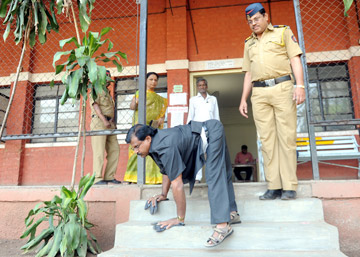 |
|
Let us stop this happening
in Sri Lanka |
Giving a completely different dimension to the current political
fiasco, 12 persons with disabilities have courageously waded into the
August 17 Parliamentary Elections battle, pitting themselves against the
more seasoned able bodied contenders.
A first in the election history of Sri Lanka, these candidates, who
have formed two independent groups, will be contesting from Colombo and
Gampaha Districts, to protect the rights of all Sri Lankans living a
life with physical, visual, hearing or intellectual disability. Their
aim is to bring in independence, security, opportunity and acceptance
for persons with disabilities in the present society.
The Colombo District team is lead by W. M.J. Rathnasekara, who has
been actively and tirelessly campaigning to protect the rights of
visually impaired persons over a long period of time. The Gampaha
District is lead by Prasanna Kuruppu, a former officer of the Sri Lanka
Air Force, disabled in the 1990s in Palali, and now working as an
executive level officer in the private sector.
The contestants are trying to give new impetus to their long standing
efforts to protect the rights of those with disabilities by representing
them in the country's legislature, says Prasanna Kuruppu, Convener of
'Raising Our Voices for Us', the umbrella organisation spearheading the
election campaign for the two independent groups.
1.6 million differently-abled
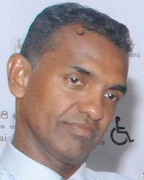 |
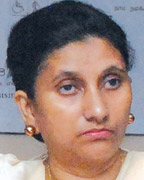 |
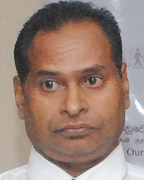 |
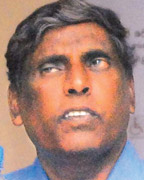 |
| Bryan Susantha
contesting from the Colombo District |
Manique
Gunarathna,
an activist |
Anil Jayawardane
contesting from Gampaha District
|
W. M.J. Rathnasekara,
Colombo District leader
|
According to a 2012 survey conducted by the Department of Census and
Statistics, persons living with difficulties due to disabilities
comprise nearly 8.7% of the Sri Lankan population - which amounts to
more than 1.6 million persons.
"They are a special community who hold an unbelievable capacity to
serve the country if a conducive platform is created," says Kuruppu,
explaining that providing the needed facilities and opportunities for
employment will enable the differently abled to independently conduct
their day to day living and render service to the country.
The Sri Lanka Constitution accepts all citizens as equals but
overlooks the difficulties faced by persons with disabilities. An
attempt to rectify the situation was made with Act 28 of 1996, for the
Protection of the Rights of Persons with Disabilities. "However, it was
able to protect only our rights in the education sector and employment
opportunities. Even the National Policy on Disability established in
2003 cannot be implemented properly due to lack of legal provisions.
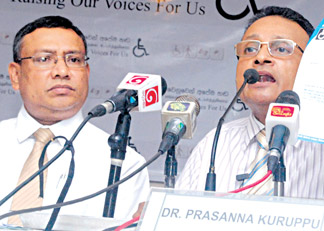 |
|
Ajith C. Perera (right) and
Prasanna Kuruppu |
This actually indicates we, the persons with disabilities are kept at
a distance from equally enjoying the legal protection given to others in
the country," points out Kuruppu.
The National Policy was drafted to 'ensure persons with disabilities
will have opportunities for enjoying a full and satisfying life and for
contributing their knowledge, experience, particular skills and
capabilities to national development as equal citizens of Sri Lanka.'
However, the Bill to Protect the Rights of Persons with Disabilities
drafted in 2006 did not come into effect, even though it was approved by
the Cabinet of Ministers. Kuruppu being a former officer of the Sri
Lanka Air Force is also concerned about the rights of the disabled
ex-servicemen and has made it part of the campaign "While in service
soldiers get considerable attention but when they retire it is difficult
for them to get proper medical attention and support," he points out.
Taking into account the medical care required for ex-service men as
well as others with disabilities, 'Raising Our Voice For Us' is
campaigning to create a better life for the differently abled.
Accordingly the organisation's Manifesto pledges, among other things, to
establish rehabilitation centres at each Province, give due prominence
to sign and Braille languages while issuing public documents and bring
in standards to assistive and mobility devices imported or manufactured
locally.
Numerous
Kuruppu says the two independent groups faced numerous obstacles
during the initial stages of submitting their nominations, even at the
Department of Elections, as many of the government institutes do not
facilitate persons with disabilities. "The officials at the Department
of Elections faced difficulty as they were not equipped properly to
assist us," he points out, explaining that there were no sign language
translators and the members faced accessibility problems.
However, Kuruppu sees the public officers accepting that the
requirements of persons with disabilities need to be met and making an
effort to fulfill these needs, as winning half the battle. In this back
drop, efforts by the Commissioner of Elections Mahinda Deshapriya and
his staff to properly implement the legal provisions, making every
eligible citizen receive an equal opportunity to mark his democratic
right, is highly appreciated by persons with disabilities, says Kuruppu
In a recently issued statement the Elections Commissioner stated that
'according to the existing law, any person who is unable to convey
him/herself to and from the polling station due to any physical
disability, on foot or by any public transport, may under Section 83(4)
(d) apply for a vehicle from the Returning Officer of his/her electoral
district, by him/herself or by another person other than a candidate.'
Persons with disabilities need to forward the application for this
facility to the Returning Officer before August 9, 2015.
Assisted vote
A Certificate of Eligibility, issued as per the provisions under the
Elections (Special Provisions) Act No. 28 of 2011 will facilitate
persons with disabilities who need the assistance of another person to
cast his or her vote. In notifies that the assisting person should be
above 18 years of age and should not be contesting in the elections and
should not be an authorised agent or a polling agent of a political
party.
Application forms are available with the Grama Niladhari and all
District Election offices. The person assisting the differently abled
person should be named when issuing the certificate. It is notified in
the Act that any disabled voter who is unable to bring a person to
assist can cast his /her vote through the Senior Presiding Officer in
the presence of another officer.
Protecting a citizen's right to vote, regardless of disabilities is a
positive step in creating inclusion, which is not impossible as long as
the institutions and individuals have a sensitivity towards the issue.
People with Disabilities have a lot to campaign for. A photo of
differently abled person casting his or her vote would always qualify
for the page one in any newspaper, during an election. Yet the
difficulty they undergo to reach counter goes unnoticed.
"These benefits we are trying to achieve will be not only for us. It
will be equally beneficial for women, youth, children and the elderly
when properly implemented. It can serve a majority of the society," adds
Kuruppu. |

